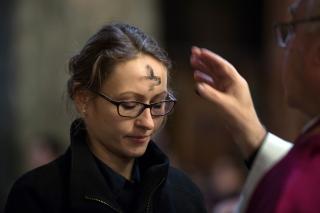Connected by Mortality
By Lora Brandis
“All living substance, all substance of energy, being, and purpose, are united and share the same destiny.”
—Rev. David Eaton, “A Common Destiny” (YouTube)
Last year on Ash Wednesday, I wondered how to best mark the beginning of Lent. Seeking a way to honor both the Christian tradition of my childhood and my chosen faith of Unitarian Universalism, I wandered into a chapel at a Dallas hospital to receive the imposition of ashes.

Yes, that’s right—imposition, meaning imposed upon the head. Imposition, as a noun, can also mean burden, annoyance, hassle, which—for some who have been wounded by Christianity—seems a good definition. But this is imposition as verb; imposition as religious ritual. This is what I wanted when I intentionally wandered into the chapel at Parkland Hospital that morning, after visiting one of our members receiving care there. I wanted someone, anyone, to impose the ashes on my head with the usual words: “Remember that you are dust, and to dust you shall return.”
Those were the words spoken by my colleague, Rev. Aaron White, as we gathered just a week earlier in a private ceremony prior to my daughter Zoe’s memorial service at First Unitarian Church of Dallas. Aaron prayed, and then with the assistance of a staff member who had been the director of youth ministry when Zoe attended the church, placed ashes in each of our hands saying, “From dust we come, to dust we will return.”
Unfortunately, those were not the words said as a chaplain imposed the ashes on my forehead in the hospital chapel. Instead, I was told, “Repent and be renewed in your faith in the Gospel.” Oh, not the ritual I was hoping for. Nevertheless, I sat down for a brief prayer and cried. I cried, not because the words were wrong. I cried because I came seeking comfort from an ancient ritual and I received the comfort I had been seeking. The words were wrong for me, but not for others silently praying in the chapel with me that morning. I was not alone.
The words were wrong for me, but the ritual was not. I needed to be reminded that we are all mortal. I wanted the mark on my forehead for all to see that this—impermanence, mortality, ashes, dust—is the truth of being human. And we are not alone.
Prayer
Dear holy one, mark us for all to see that we are connected by our mortality. Impermanence, mortality, ashes, dust: this is the truth of being human. Remind us that this truth is what connects us. Remind us, also, that from love we come and to love we will return.